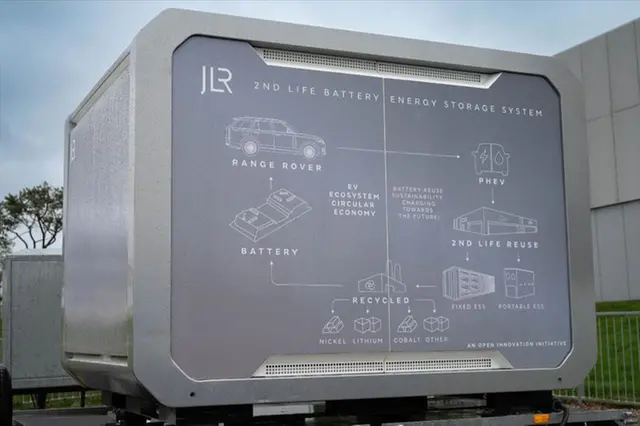JLR has announced it has partnered with energy storage startup Allye Energy to create a novel Battery Energy Storage System (BESS).
It was shared that a single Allye MAX BESS holds seven second-life Range Rover and Range Rover Sport PHEV battery packs that are removed from the vehicles and slotted into customised racks, without unnecessary additional processing. Each BESS can store 270kWh of energy at full capacity.
The BESS can charge up to nine Range Rover PHEVs at any one time, and can be plugged into any CCS-capable Vehicle Charger using the same input as JLR’s existing PHEV and BEV product portfolio.
Multi-input connectivity via power lock connections also enables it to be connected to renewable power at fixed or off-grid sites.
According to the two, the MAX BESS can be used to replace diesel generators to power off-grid vehicle launches, events and vehicle tests in remote areas.
JLR’s Engineering team is the first to utilise the new BESS and will use it to power over 1000 hours of testing, which, it said, will save more than 15,494kg of CO2 during the course of a year.
The BESS weighs less than 3.5 tonnes, allowing it to be fully portable or stationary, meaning that it can support JLR’s network of over 3000 retailers to better leverage renewable energy such as solar and act as energy buffers to support fast charging where the local grid connection may be restricted.
The unit will also be commercially available for use outside of JLR, it was shared.
It was noted that one example of how the BESS is being used practically in the development of Range Rover Electric is through the engineering team’s prolonged endurance testing at remote off-road sites where only low-power connections are available.
The engineers are able to top up the BESS from a low power supply during testing and then transfer the power to the Range Rover Electric via fast charging from the BESS, much more quickly than directly charging the vehicle from the supply.
JLR said that its batteries can be safely deployed in low-energy situations once their health falls below electric vehicle requirements, which typically leaves a 70-80 per cent residual capacity.
Following these second-life use cases, JLR will recycle the batteries so that raw materials can be recovered for reuse.
François Dossa, Executive Director, Strategy and Sustainability at JLR, commented: “Our Reimagine strategy is all about shifting our mindset to consider circular over linear business models. This battery innovation and partnership with Allye demonstrates the value we can create from repurposing and reusing batteries, such as from our Range Rover vehicles. We are creating new value from a used commodity that would otherwise go directly to recycling, keeping them in use for longer, and providing innovative renewable energy storage solutions.”
Jonathan Carrier, CEO of Allye, said: “The deployment of Range Rover PHEV batteries in the MAX underscores Allye’s agnostic approach to integrating batteries from different models, of different states of health (SoH), and cell chemistries to maximize efficiency and sustainability.”




